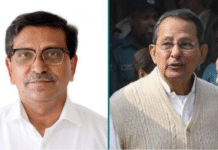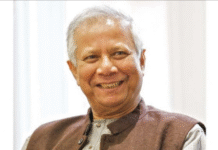Prof Yunus, international experts celebrate successes on Social Business Day
When Prof Muhammad Yunus came up with the idea of social business a few years ago, many conventional businesses and economic experts raised eyebrows, expressing doubt whether it would ever work.
Although the theory is yet to offer widespread successes in terms of actions, the amount of attention it has generated locally and globally — in developed and developing world — proves the anti-poverty pioneer has passed the first test of getting people engaged.
This was again evidenced yesterday as around 1,000 people, many from abroad, spent the day in Dhaka, to hear the worldwide developments in social business.
They thronged the Radisson Hotel in the city in the morning to attend the fourth Social Business Day.
The event coincided with the birthday of Nobel laureate Prof Yunus, who turned 74 yesterday.
The day’s proceedings started with showering Yunus with birthday wishes. Everybody in the vast hall-room of the hotel stood and sang the Happy Birthday song.
Sir Richard Branson, owner of Virgin Group, sang birthday wishes with a group of people in a pre-recorded video displayed at the event.
Speaking at the inaugural ceremony, Yunus said the idea of social business is spreading across the world in a serious way, opening many frontiers. The European Union has also made a policy on the social business. Africa is also coming up. Brazil is opening its doors for the social business.
He trashed away ideas that only people with enough money could set up social business. “Not only the major corporations and foundations, but also people with a very small amount of money can launch social businesses and become successful and thus solve a social cause.”
The Grameen Bank founder said people working on spreading the idea are being invited to solve social problems even in developed world.
He said his vision is to see one percent of the total investment of a country is made in the social businesses within the next five years. “We have to show the success stories at the ground level. It will change the people’s mind.
“One example can change people’s mind. So, we are holding the Social Business Day.”
About the future of social business, the banker to the poor said, “We have just started the social business. It will bring a paradigm shift in the world business.”
US Ambassador Dan Mozena said Prof Yunus had not only given a model but also an opportunity to the poor people to invest and lift themselves out of poverty and also to become contributing members of the society.
“In the past, those things were termed radical,” he said, adding that the microcredit and social business ideas were helping Bangladesh to grow rather than remaining vulnerable.
The diplomat said Grameen Bank had changed many lives in the US also.
“It’s a beautiful situation in the USA,” he said, adding that Prof Yunus has helped people take their dreams to a new height.
Mozena said the successful models of microcredit and social business have proved critics wrong; the banker to the poor is now termed the “dreamer and builder of new life”.
Malaysian Crown Prince Yam Tengku said the social businesses had become a mainstream business model rather than an alternative form of business.
He said poverty had largely been eradicated in Malaysia, but some issues in the country were needed to be worked on.
“We need social business not only to solve those social problems in this country, but also to make the world a better place for everybody.”
In a plenary session, Emmanuel Faber, CEO of France-based Danone, said social business is a highly innovative idea and powerful answer to social problems.
“Social business is a radical innovation and it brings in a completely new solution to businesses. It is not just a simple change in the conventional business.”
He said more than a dozen French companies, with combined annual revenue of $200 billion, have set up social businesses in the country.
Emmanuel Faber also said the theory had opened a new horizon of business and opportunities for entrepreneurs around the world.
Binod Chaudhary, chairman of Chaudhary Group, Nepal, and also the first billionaire in the country, said billions of dollars are spent every year around the world to lift people out of poverty. But their fates have not changed much.
“The world will have to follow the philosophy of Prof Yunus to eradicate poverty. This is the way to go,” he said.
“I truly believe that if we can give the social business a momentum, we will be able to solve some of our pressing challenges — in my country and around the world.”
Chaudhary also said the society’s youth would have to be made the driver of the change.
At a discussion on microfinance and social business, Larry Reed, director of Microcredit Summit Campaign, said entrepreneurs of the social business would have to ensure that their services and products really solve a social problem.
He said a social accounting tool could also be put in place so clients are served as intended, so social businesses do not face the same bad repute as microcredit did in India, putting the whole industry around the world under tremendous pressure.
“Mission drift could happen if there is dividend for social businesses. Or, people could start working only for increasing their salaries, rather than increasing social benefits for the intended beneficiaries. This will be the major challenge for social businesses.”
Daniel B Zoltani, Asia Pacific regional director for the Whole Planet Foundation, said social performance, instead of economic performance, would have to be given priority in case of social businesses.
He is opposed to any regulation for social business at this stage of the growth of the concept.
Rokia Afzal Rahman, president of Metropolitan Chamber of Commerce and Industry, Dhaka, said students were increasingly interested about the social business.
She also said sometimes profit-maximisation should not be a target for a business.
“Doing businesses for others could not only solve problems of some people, but also give peace to the entrepreneurs,” she said during the panel discussion on “Social Business: Entrepreneurs and Investors”.
UN Youth Champion Monique Coleman said social business was the new way to reach out to the people in need, as charity model was most of the time not sustainable and exhausting.
“This is a way to find a measurable and sustainable impact of the solutions intended to help people,” she said.
The Hollywood actress also said the younger generation was imbedded with the ideas of social business. “So, we will have to raise awareness and convince younger generation.”
Also during the event, social business projects in Bangladesh displayed their products and services. A photo exhibition was also organised.
During the day, a web portal, socialbusinesspedia.com, was launched. It will have all the real-time information about global social business activities.
Apart from local participants, about 160 participants from 30 countries attended the annual event.
According to Prof Yunus, social business is a cause-driven business where the investors or owners can gradually recoup the money invested, but cannot take any dividend beyond that point.
Purpose of the investment is purely to achieve one or more social objectives through the operation of the company; no personal gain is desired by the investors.
Source: The Daily Star











